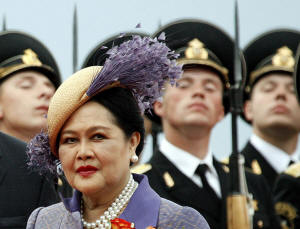Thailand's Queen Mother Sirikit has died at age 93
[October 25, 2025]
By DENIS D. GRAY, JINTAMAS SAKSORNCHAI and TIAN MACLEOD JI
BANGKOK (AP) — Thailand’s Queen Mother Sirikit, who supervised royal
projects to help the rural poor, preserve traditional craft-making and
protect the environment, died on Friday. She was 93.
The Royal Household Bureau said she died in a hospital in Bangkok,
adding that she began suffering from a blood infection on Oct. 17 and
despite her medical team’s efforts, her condition did not improve. She
suffered a stroke in 2012 and was afterwards largely absent from public
life due to declining health. Her husband, King Bhumibol Adulyadej, died
in October 2016.
The bureau's statement said King Maha Vajiralongkorn had directed that
she be given a funeral with the highest honors, and that he had
instructed members of the royal family and royal servants to observe
mourning for one year.
Mourners gathered outside Chulalongkorn Hospital on Saturday morning
after hearing the news.
“It is yet again another great loss for the whole nation. I heard about
it at 4 a.m. I felt like fainting. The whole world seemed like it had
stopped," said 67-year-old Maneerat Laowalert.
Prime Minister Anutin Charnvirakul said Saturday that Sirikit's passing
was “a great loss for the country.” He said the national flag will fly
half-staff at all government agencies for 30 days, and civil servants
will observe mourning for one year.
Although overshadowed by her late husband and her son, the current king,
Sirikit was beloved and influential in her own right. Her portrait was
displayed in homes, offices and public spaces across Thailand and her
Aug. 12 birthday was celebrated as Mother’s Day. Her activities ranged
from helping Cambodian refugees to saving some of the country's
once-lush forests from destruction.

The Thai monarchy traditionally has avoided playing an open role in
politics, but in recent decades of political upheaval, marked by two
military takeovers and several rounds of bloody street protests,
speculation grew about Sirikit’s views and her behind the scenes
influence. When she publicly attended the 2008 funeral of a protester
killed during a clash with police, many saw it as her taking a side in
the political schism.
Sirikit met the king while living in Europe
Sirikit Kitiyakara was born into a rich, aristocratic family in Bangkok
on Aug. 12, 1932, the year absolute monarchy was replaced by a
constitutional system. Both of her parents were related to earlier kings
of the current Chakri dynasty.
She attended schools in wartime Bangkok, the target of Allied air raids,
and after World War II moved with her diplomat father to France where he
served as ambassador.
At 16, she met Thailand’s newly crowned king in Paris, where she was
studying music and languages. Their friendship blossomed after Bhumibol
suffered a near-fatal car accident and she moved to Switzerland, where
he was studying, to help care for him. The king courted her with poetry
and composed a waltz titled, "I Dream of You."
The pair married in 1950, and at a coronation ceremony later the same
year both vowed to "reign with righteousness for the benefit and
happiness of the Siamese (Thai) people."
The couple had four children: current King Maha Vajiralongkorn, and
princesses Ubolratana, Sirindhorn and Chulabhorn.

[to top of second column]
|

Queen Mother Sirikit passes by Russian honor guards while arriving
in Moscow Vnukovo airport, July 2, 2007. (AP Photo/Misha Japaridze,
File)

During their early married life, the Thai royals crisscrossed the
world as goodwill ambassadors and forged personal ties with world
leaders.
A turn to Thailand's rural areas
But by the early 1970s, the king and queen turned most of their
energies to Thailand's domestic problems, including rural poverty,
opium addiction in hill tribes and a communist insurgency.
The queen, an impeccable dresser and avid shopper, also relished
climbing hills and visiting simple villages where older women would
call her "daughter."
Thousands raised their problems to her, ranging from marital
squabbles to serious diseases, and the queen and her assistants took
up many personally.
While some in Bangkok gossiped about her involvement in palace
intrigues and her lavish lifestyle, her popularity in the
countryside endured.
"Misunderstandings arise between people in rural areas and the rich,
so-called civilized people in Bangkok. People in rural Thailand say
they are neglected, and we try to fill that gap by staying with them
in remote areas," she said in an interview with The Associated Press
in 1979.
Royal development projects were set up across Thailand, some of them
initiated and directly supervised by the queen.
In 1976, the queen launched a foundation to promote Thai traditional
handcrafts. The SUPPORT foundation has trained thousands of
villagers in crafts including silk-weaving, jewelry-making, painting
and ceramics.
She also set up wildlife breeding centers, "open zoos," and
hatcheries to save endangered sea turtles. Her Forest Loves Water
and Little House in the Forest projects sought to demonstrate the
economic gains of preserving forest cover and water sources.
While royalty elsewhere had only ceremonial or symbolic roles, Queen
Sirikit believed the monarchy was a vital institution in Thailand.

"There are some in the universities who think the monarchy is
obsolete. But I think Thailand needs an understanding monarch," she
said in the 1979 interview. "At the call, ‘The king is coming,’
thousands will gather.
“The mere word king has something magic in it. It is wonderful."
___
Associated Press journalist David Rising in Kuala Lumpur, Malaysia
contributed to this report. Denis D. Gray served as longtime Bangkok
bureau chief before his retirement.
All contents © copyright 2025 Associated Press. All rights reserved |